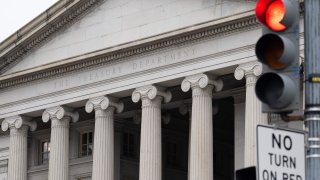
- The June 1 "X date" is approaching, the earliest the U.S. government could run out of money to pay its bills if leaders do not reach a deal to lift the debt limit.
- The think tank Bipartisan Policy Center modeled the Treasury Department's cash flow, noting what day bills are paid.
- The schedule offers a look at the government's spending priorities as it approaches June 1.
WASHINGTON — The June 1 "X date" is approaching, the earliest the U.S. government could run out of money to pay its bills if leaders do not reach a deal to lift the debt limit.
After that date, the Treasury will have to decide which obligations don't get paid, even as multiple critical bills are due.
Lifting the debt ceiling is necessary for the government to cover spending commitments already approved by Congress and the president — and prevent default. Doing so does not authorize new spending. President Joe Biden is currently in a standoff with House Speaker Kevin McCarthy, who has refused to raise the debt limit if Biden and lawmakers do not agree to future spending cuts. McCarthy said he hopes the House will vote on a debt limit bill as soon as next week.
Get New England news, weather forecasts and entertainment stories to your inbox. Sign up for NECN newsletters.
The think tank Bipartisan Policy Center modeled the Treasury Department's cash flow, noting what day bills are paid. The schedule offers a look at the government's spending priorities as it approaches June 1.
The Treasury has taken extraordinary steps to keep paying the government's bills, and expects to be able to avoid a first-ever default at least until early June. Treasury Secretary Janet Yellen demurred when asked in an interview with CNBC this month what bills would be prioritized in the event of a default.
Here's a look at the bills that come due in the first half of June, according to analysis from the Bipartisan Policy Center based on daily and monthly Treasury statements. Only the major spending categories are outlined, meaning the numbers may not add up to the total spending due that day.
June 1: $101 billion in spending due; estimated $26 billion in revenue
- Medicare: $47 billion
- Veterans benefits: $12 billion
- Military pay and retirement: $10 billion
- Civil service retirement: $6 billion
June 2: $40 billion in spending; $18 billion in revenue
- Social Security benefits: $25 billion
- Medicaid: $2 billion
- Education programs: $1 billion
June 5: $13 billion in spending; $33 billion in revenue
- Medicare: $1 billion
- SNAP benefits: $1 billion
- Defense vendor payments: $1 billion
June 6: $17 billion in spending; $15 billion in revenue
- Medicaid: $6 billion
- Defense vendor payments: $2 billion
- Education programs: $1 billion
June 7: $16 billion in spending; $18 billion in revenue
- Defense vendor payments: $2 billion
- Transportation programs: $1 billion
- Individual tax refunds: $1 billion
June 8: $18 billion in spending; $13 billion in revenue
- Medicaid: $6 billion
- Defense vendor payments: $2 billion
- Education programs: $1 billion
June 9: $21 billion in spending; $18 billion in revenue
- Federal salaries and insurance: $5 billion
- Medicaid: $5 billion
- Education programs: $1 billion
June 12: $23 billion in spending; $33 billion in revenue
- Pension Benefit Guaranty Corporation: $7 billion
- Federal salaries: $2 billion
- SNAP benefits: $1 billion
June 13: $15 billion in spending; $15 billion in revenue
- Defense vendor payments: $3 billion
- Medicaid: $2 billion
- Medicare: $1 billion
June 14: $38 billion in spending; $37 billion in revenue
- Social Security benefits: $25 billion
- Individual tax refunds: $1 billion
- Medicaid: $1 billion
June 15: $22 billion in spending; $79 billion in revenue (quarterly tax receipts are due)
- Military salaries: $4 billion
- Medicaid: $3 billion
- Interest on public debt: $2 billion
June 16: $12 billion in spending; $29 billion in revenue
- Medicare: $2 billion
- Medicaid: $1 billion
- Defense vendor payments: $1 billion




